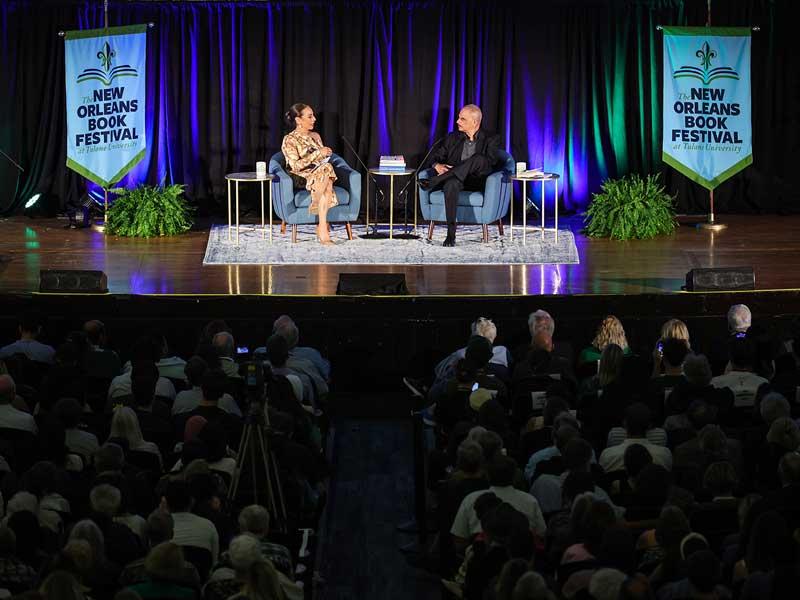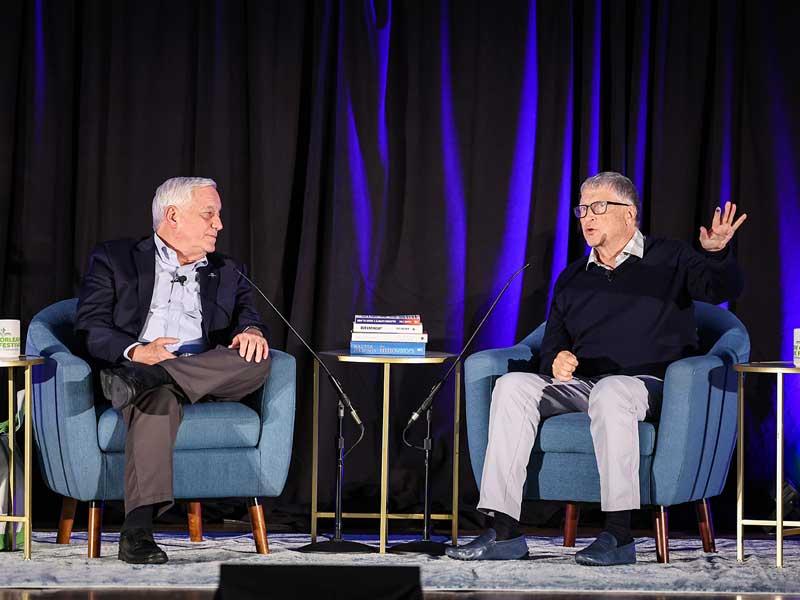Conversations with Bill Gates, Eric Holder lead off New Orleans Book Festival
The 2023 New Orleans Book Festival at Tulane University opened on Thursday, March 9, with an amazing pair of sessions: conversations on relevant current events with Microsoft founder and philanthropist Bill Gates and former U.S. Attorney General Eric Holder, a past Tulane parent.
In introducing the evening’s sessions, President Michael A. Fitts welcomed the audience to McAlister Auditorium saying, “Each and every one of us is shaped by the power of the written word in ways small and large.”
He then went on to explain how Harper Lee’s To Kill a Mockingbird set him on the path to study law, the same path that would eventually lead him to Tulane.
Gates headlined the evening in an engaging, frank and thoughtful conversation with Tulane faculty member Walter Isaacson, the Leonard Lauder A. Professor of American History and Values. The conversation touched on some of society’s most pressing challenges, such as renewable energy and pandemics while noting Gates’ ongoing effort to provide solutions to these global issues through philanthropy and technology.
Gates’ current focus is mostly with the Bill & Melinda Gates Foundation, which is dedicated to fighting “poverty, disease and inequity around the world.”
Gates, author of the bestseller How to Avoid a Climate Disaster (Knopf 2021) discussed sources of renewable energy and the technology and infrastructure that make them possible. Weather-dependent sources, such as solar energy, cannot be relied on to generate 100% of our energy needs, and storage may also be a problem, Gates said.
Isaacson, whose friendship with Gates goes back years, asked him if he still eats hamburgers, considering that beef consumption significantly affects climate change.
“I still have a fairly high meat consumption,” Gates admitted. “I do try out the Beyond and Impossible and the other artificial products, which are getting pretty good.”
He added he is optimistic that meat alternative products will improve in taste and cost in the future.
When the talk turned to the COVID-19 pandemic, Isaacson pointed out that in 2015, Gates, author of How to Prevent the Next Pandemic (Knopf, 2022) had famously said that the world wasn’t prepared with an adequate pandemic response.
Gates reflected on what the U.S. learned after the response to COVID-19. “We really weren’t practicing what needed to be done,” he said, noting that even amid such a high death toll, “it could have been a lot worse,” in comparison to diseases such as smallpox and Spanish flu. The Bill and Melinda Gates Foundation now works with its partners on strengthening global pandemic responses.
Looking back on his transformative career, Isaacson asked about the moment in time when Gates made the pivot from tech entrepreneur to philanthropist. With a nod to his parents, who he said were selfless people and good examples of giving to others, Gates explained that he knew in the 1990s that he wanted to direct money toward charitable endeavors, such as malaria prevention and treatment.
“People whose children have malaria have so little money that there isn’t the market incentive to invent a malaria vaccine,” said Gates, who was fascinated by the lack of progress against the disease. “I found myself being drawn into that.” Now malaria elimination is one of the foundation’s top priorities.
Other topics that the two covered included artificial intelligence, K-12 education and online learning, and vaccine technology. Isaacson, who along the way informed the audience how Tulane’s research addresses some of these areas, asked Gates which field he would choose if he had to restart his career as a young entrepreneur.
“The sciences, broadly,” he replied, “whether it’s health sciences, climate sciences, artificial intelligence. If you’re inclined to be able to work in one of the sciences, they are pretty profound in terms of bringing us big innovations.”
And because it was a book festival, Gates shared that he was reading Born in Blackness: Africa, Africans, and the Making of the Modern World, 1471 to the Second World War by Howard W. French.
Earlier in the evening, journalist, co-host of “CBS Saturday Morning,” and one-time New Orleans news anchor Michelle Miller interviewed Holder about his work, civil rights and his book, Our Unfinished March, which was published last year.
Holder discussed the nation’s history of voting rights, the concept of democracy vs. democracy-infused ideals, the power of enthusiastic younger generations, and fighting disinformation with tools such newspapers and personal involvement to ensure that everyone’s voice is heard.
Holder said as a young teenager in Queens, New York, he watched on TV as civil rights events unfolded in places like Selma, Alabama. That experience had a profound effect on him and set the stage for a lifetime of service.
“I see these folks getting beaten. ‘What is this all about? Aren’t they just marching for the right to vote?’” Holder said he was incredulous having seen his parents vote all the time. “That kind of piqued my interest in why was this differential treatment between North and South. Why were African Americans in the South denied the right to vote? All of this became a part of who I was and who I am.”
To frequent applause, Holder went on to relay examples of voter suppression but emphasized that Americans nonetheless have the power to fight disinformation and to champion equal treatment for all Americans.
Besides serving as moderator, Miller is also an author, having penned the memoir Belonging: A Daughter's Search for Identity Through Loss and Love, newly published this month. Miller will appear at a Book Festival session moderated by Sharon Epperson on Friday.
Watch future issues of Tulane Today for recordings of selected Book Festival discussions, including Bill Gates.



